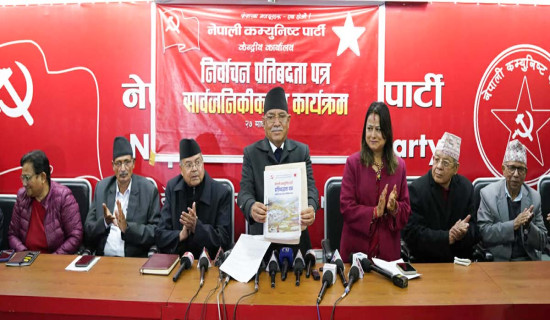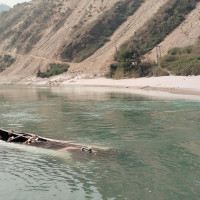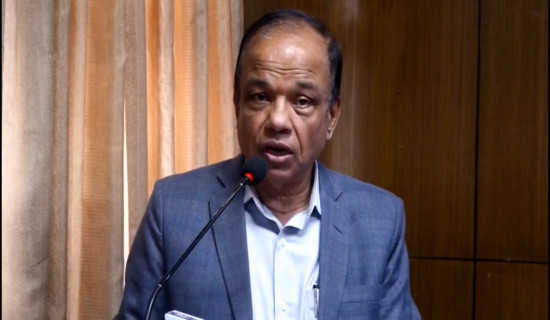- Wednesday, 11 February 2026
Bidya, UML On Collision Course?
Unfazed and determined, former president Bidya Devi Bhandari refused to surrender to the establishment of CPN-UML that has recently revoked her party membership in an unexpected move last Tuesday. Bhandari had renewed her party membership two years ago after serving the country’s highest ceremonial post twice. The annulment of her membership by the party’s central committee meeting has stunned both UML functionaries and outside observers. Can the membership of the former vice-chair and long-time devoted worker be rescinded? Oh, the spouse of late Madan Bhandari has been denied membership! This emotional thinking also swirls the minds of many UML workers.
On Friday, Bhandari organised a press conference to respond to the UML’s decision to prevent her from being engaged in the UML. Enraged over the party’s announcement of deactivating her party membership, she said, “A handful of friends cannot do this forcefully and by coming under instigation.” According to her, the party’s decision to deny membership contravenes the constitutional right to freedom and the spirit of People's Multiparty Democracy (PMD), UML's guiding principle. She has termed it ‘invalid’, ‘immature’ and ‘unjust.’ Her strong reaction is expected to further agitate the UML rank and file as the party is bracing for the statute convention in early September.
Message
Bhandari has tried to give several messages to the party through the presser. First, she has, for the first time, presented herself as the vice-chair of the party. Before her election as the president in 2015, she was the UML vice-chair. It is relevant to mention that she had played a critical role in electing the incumbent head KP Sharma Oli as the party’s chair in its 9th convention held in Kathmandu in 2014.
Second, she has claimed she carries the legacy of late Bhandari and invoked him at the much-anticipated press meet. “Late Madan Bhandari granted me party membership and administered the oath of secrecy 45 years ago when the former was the charge of Koshi zone. No one can snatch the membership given to me by Madan Bhandari,” she said. Late Madan Bhandari, a charismatic leader, steered the party at a time when the international communist movement suffered a huge setback in the early 1990s. He propounded PMD, which helped democratise Nepali communists, enabling them to be major players in Nepali parliamentary politics.
The third important message is that her commitment to the UML is beyond question. She held the press conference under the banner that contained an image of late Bhandari, UML’s poll symbol – 'Sun' and a slogan of PMD. There is a rumour that Bhandari would go to the extent of splitting the party after she was denied membership. The fourth message is that she does not crave power and a post. It is believed that the UML moved to terminate her membership after she, in an interview with a television channel, indirectly said that she would contest for the post of party chair. Her claim to the party leadership did not go well with the UML establishment that sees her entry as a ploy to weaken the party's 84 mission.
It is interesting to note that both the UML and Bhandari have cited the constitution to prove each other’s position. The UML has stated that it is not possible and not allowed for a person who has become the head of state, symbol of national unity, protector and adherent of the constitution, supreme commander of the army and nation’s guardian to be a member and cadre, or leader of a particular party. It has even warned that her re-entry into politics will set a wrong precedent among people, the system and the spirit.
However, Bhandari has argued that the constitution guarantees the right to freedom of belief and the right to be affiliated with a political party as fundamental rights and no article or spirit of the constitution precludes her from being politically active. Stating that PMD fully embraces constitutional supremacy and the rule of law, she said there is no justifiable reason to exclude her from party membership on the grounds of principle. However, it is entirely a political issue, not a constitutional one, for the constitution keeps mum about the involvement of the former president in politics.
Moral question
A strong moral question posed to Bhandari is: Does it behoove her to enter party politics after holding the highest state position – the President? A good number of people inside and outside the party do not want her to get involved in the partisan affairs. This moral issue entirely depends on her – whether or not to accept it. To justify Bhandari's attempt to reenter the UML, her supporters offer instances where the heads of state or government of other nations have rejoined politics or assumed junior positions after leaving the top job.
Former president Theodore Roosevelt established the Progressive Party in 1912 after losing the presidential nomination of the Republican Party to incumbent president William Howard Taft. Charles de Gaulle resigned as the provisional president of France in 1946 and went on to form a new political force, which, however, failed to make an impressive electoral gain. British PM David Cameron was in charge of the foreign ministry after retiring from the premiership. Singapore PM Lee Kuan Yew and former Israeli president and prime minister Shimon Peres had held ministerial portfolios upon retiring from the highest executive post. These are some examples presented in favour of Bhandari. However, it is the UML leaders and cadres who can seal her political fate. And her latest retort is sure to put her on a collision course against the UML establishment.
(The author is Deputy Executive Editor of this daily.)





-square-thumb.jpg)


-square-thumb.jpg)








